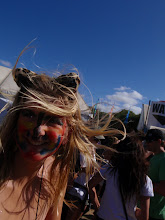I think I was probably the only one in the lecture who does not use Wikipedia. That's not to say I haven't heard of it before, but I remember being told, years ago (perhaps at uni first time round, or in high school) that the information on Wikipedia is not reliable, and so I've never really bothered with it after that. I've also never bothered thinking about how the information on Wikipedia is created so the lecture was actually a bit of an eye opener for me!
One of the disadvantages brought up in the lecture is the lack of 'expert' quality control, meaning that students could be picking up false information. However I don't see this as a disadvantage, it is just something teachers have to be aware of so they can arm their students with appropriate skills.
Students must be taught how to critically analyse all sources of information, whether it be a wiki or a book, to construct their own understanding. Wikis may not be expertly controlled but as long as students are aware of this they should be allowed to decide for themselves, through further inquiry, whether the information they provide is valid or not.
This inquiry approach, where students are the ones deciding which information is important/valid/correct is so much more engaging, and will lead to a deeper understanding than reading an encyclopedia ever will.
Tuesday, March 16, 2010
Subscribe to:
Post Comments (Atom)

P. Willow how have you avoided Wikipedia? That is quite amazing!
ReplyDeleteYou make some excellent points in this blog, i think you are on the cusp of being one of these blogging sensations that Mark talked about.
Maybe Wikipedia doesn't pop up as the first sight when you google something in England? Or maybe you just go for more reliable information? I think the inquiry approach you mention is a fantastic way of learning also - I have learnt to inquire more through Wikipedia and so will our students...it confused me one day when Wikipedia told me some famous person was born on a certain date and it was wrong! I felt like it had let me down! But Wikipedia is like a living person really, constantly building its knowledge and constantly learning. So I forgave it and realised that we all make mistakes - so long as we learn from them, then its alright!
ReplyDeleteHi
ReplyDeleteI used Wikipedia but just assumed it was like some sort of on-line-resource, I did not appreciate that anyone can add to it etc or that there are history pages. Now I know why there is some really weird stuff on it! e.g.I was looking hallucinogens for training that I run -it is absolutely amazing how much detail has been captured. It is great for getting photos for powerpoint presentations too!
One of the good things about Wikipedia is that all its content is under a Creative Commons licence, meaning that you can use it fairly freely as long as you attribute it. Full details of the Wikipedia CC licence are here: http://en.wikipedia.org/wiki/Wikipedia:Text_of_Creative_Commons_Attribution-ShareAlike_3.0_Unported_License
ReplyDeleteI agree with you that Wikepedia provides a great opportunity for students to apply their critical analysis skills. However, I wonder what these skills need to include. I know Arie is only told to look at one other website to verify the information she finds on the web. I don't believe this is enough, but what else should be taught. I think the discussion that sits behind each Wikepedia entry could be used as a useful resource in relation to teaching critical analysis, but what else?
ReplyDeleteI like Jenny's analogy of wikipedia being like a person who is constantly building their knowledge...very apt!
ReplyDeleteI'm also wondering the same as Meredith....what specific skills need to be taught so students are able to successfully analyse sources of information they find on the internet? Help us Mark!!
There are two main strategies students (and for that matter, the rest of us!) need to learn. One is to ask questions about the origins, authorship, history, accuracy, objectivity, completeness, currency and relevance of every digital document they come across (I know that sounds like a long list, but it eventually becomes second nature). The other is triangulation, i.e., comparing and cross-referencing each document with other sources, whether online or offline. Incidentally, I agree with Meredith that checking one other website may not be enough, especially as a lot of information is simply recycled between different websites. The amount of triangulation you need to do depends on how hard it is to answer the key questions about origins, authorship, etc.
ReplyDeleteThese two strategies - asking key questions, and triangulation - together add up to 'information literacy' or 'critical literacy'.